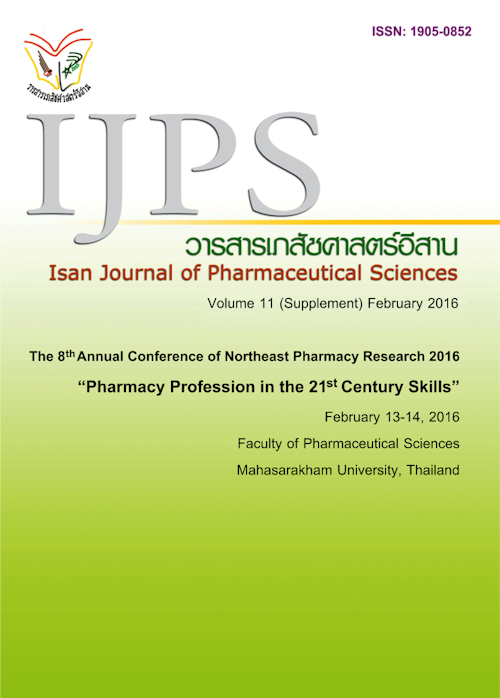The Result of Formalin Contamination Management in Lye Water Squid and Rumen with the Cooperation of the Entrepreneurs in Lampang Province
Main Article Content
Abstract
Introduction: Formalin is the chemical that is banned for use in according to the Food Act 1979. It was commonly smuggled in the seafood including lye water squids and rumen. From food safety surveillance, formalin contamination was found in seafood that sold in Lampang Province 2.0 and 1.4 percent, lye water squid and rumen showed formalin contamination 14.8 and 8.0 percent, in fiscal year 2011 and 2012 respectively. The objective of this research was to study the effectiveness of solving problem of formalin contamination in lye water squids and rumen by cooperation with the entrepreneurs. Methods: This research is a Pretest-posttest experimental study. The samples were lye water squids and rumen from the shops that sold by 17 entrepreneurs who imported lye water squids and rumen from another province, using purposive sampling. Data was collected by using questionnaires and in-depth interviews. We conducted in 7 districts in Lampang Province during October 2015-January 2016. Formalin test were performed before and after signing Memorandum of Understanding (MOU) with entrepreneurs, giving information of test kits, providing test kits to entrepreneurs. Coordination with the suppliers of entrepreneurs, providing entrepreneurs with continuous random formalin check, offering certified label "This shop sells lye water squid/rumen without formalin contamination" for whose formalin test was passed 3 times continuously These were for sustainable cooperation with entrepreneurs. Data were analyzed by using descriptive statistics and Fisher’s exact probability test. Considered statistical significant when p<0.05 Results: The study found that formalin contamination reduced from 18.3 percent to 2.3 percent after implementation, but formalin still was found in the samples from other districts. From in-depth interview, entrepreneurs were willing to cooperate in the investigation and continuous implementation. Management with the cooperation of the entrepreneurs for active surveillance is a good model. It must be implemented continuously. Conclusion: Formalin contamination management in lye water squid and rumen using the cooperation of the entrepreneurs can reduce formalin contamination in lye water squid and rumen.
Article Details
In the case that some parts are used by others The author must Confirm that obtaining permission to use some of the original authors. And must attach evidence That the permission has been included
References
Chiangmai Provincial Public Health Office. Mobile Unit for Food Safety report. the Upper Northern Province; 2013-2015.
Food and Drug Administration. Food Safety, Formalin or Formaldehyde [online] [reference date 2014 October 01] from http://www.fda.moph.go.th/project/foodsafety/formalin.
Thanmaneesin K. The Distribution Situation of Formalin Contamination in Food, 2014: Case study in Udonthani Sakonnakorn Nakornratchasima Srisaket Province.
Thanmaneesin K. Epidemology of Formalin Contamination in Fresh Food in some Northeastern Province 2014.Thai Journal of Pharmacy Practice.Vol. 7 No 1; Jan-Jun 2015: 34-36.
Lampang Provincial Public Health Office. Mobile Unit for Consumer Safety report; 2005-2015.
Lampang Provincial Public Health Office. Issue Prioritization in Health Product in Lampang Province; 2013


